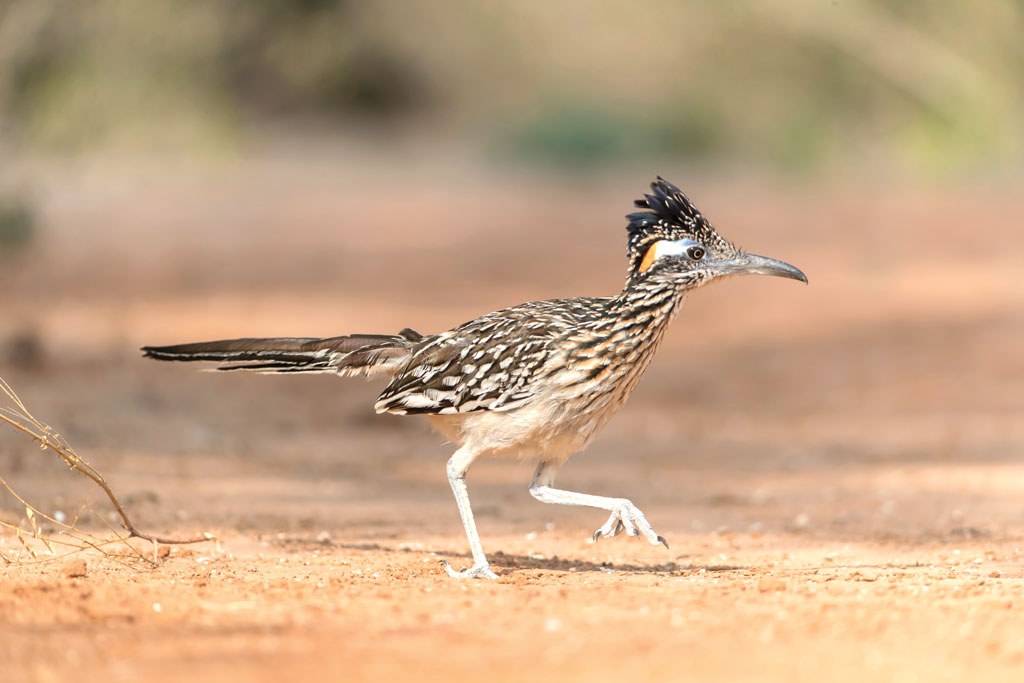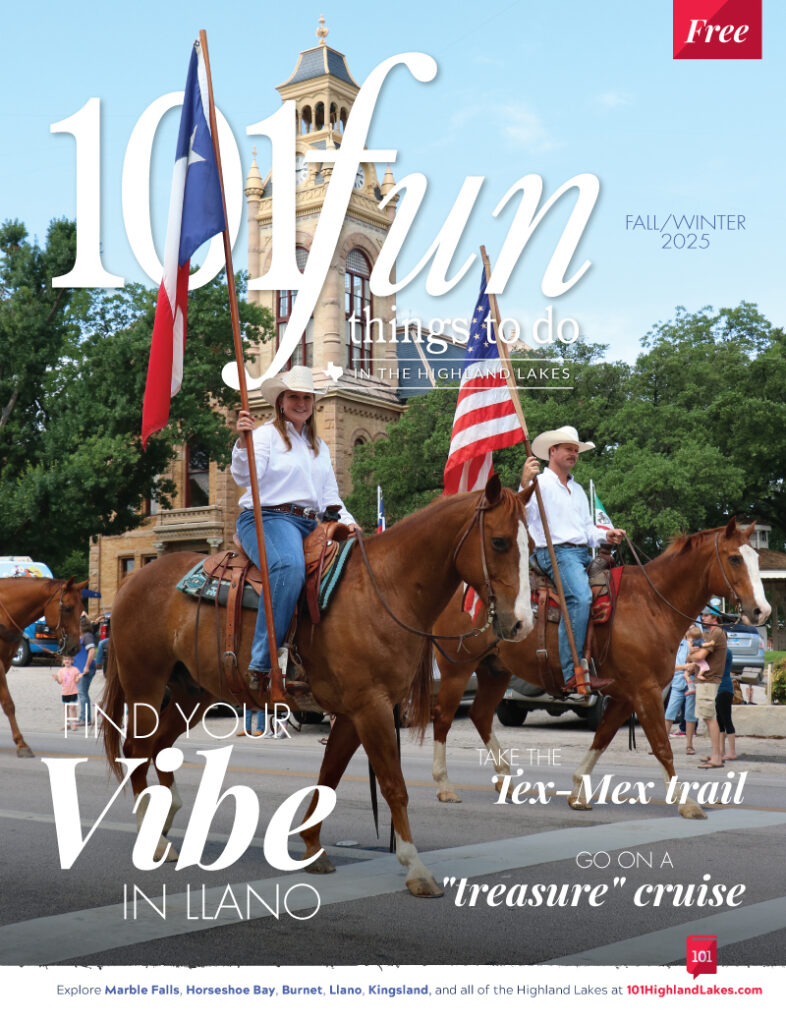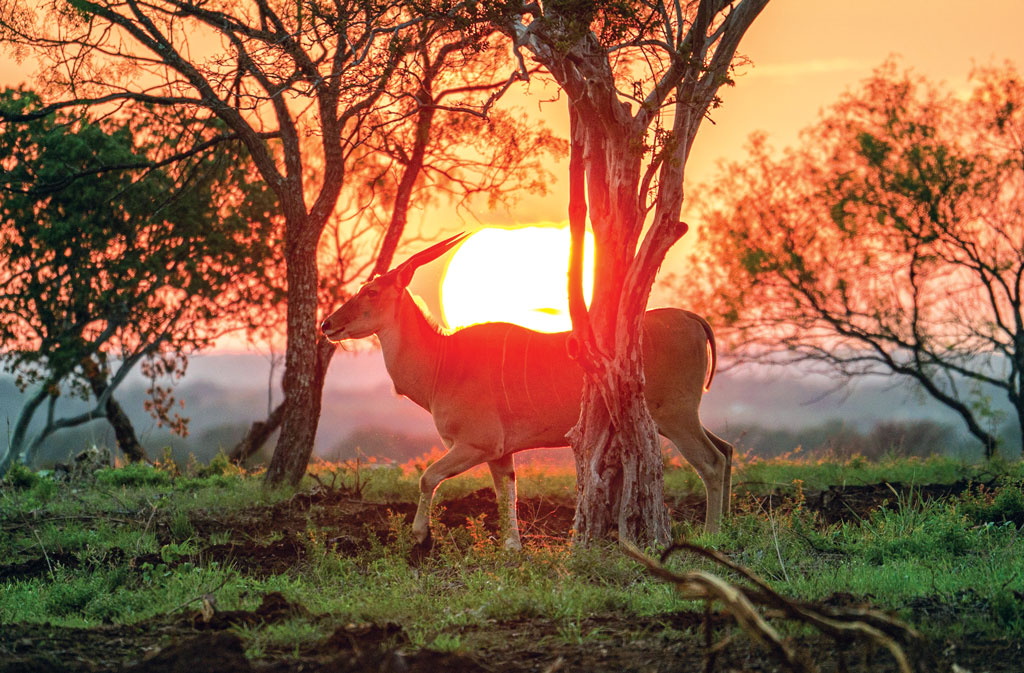
A female eland walks in front of the setting sun at Sandstone Mountain Ranch in Llano County. These are the largest antelope in the world and the species I chose to ‘target’ on my mock exotic game hunt. Staff photo by Dakota Morrissiey
The first time James Kyle Lehne visited Africa, he thought he was in the Texas Hill Country. Owner of Sandstone Mountain Ranch in the heart of Llano County, Lehne now sees Africa at home.
Sandstone Mountain Ranch is just one of many ranches in Central Texas that raises exotic wild animals for what Lehne bills as a “premiere hunting experience.” It sits on 3,000 acres of game-fenced property named for the abrupt peak that draws your eye as you approach Llano on Texas 71.
The variety of climates and ecological zones in the Lone Star State can support animals from around the world, Lehne said. The Texas Hill Country mirrors the rugged region of southern Africa, so many of the animals that roam the Savannah would do just fine in Llano and Burnet counties.
Exotic game refers to antelope, deer, sheep, goats, and other hoofstock from anywhere other than Texas. If you’ve spent enough time in the state, you might be familiar with a few of them. Axis deer and nilgai antelope are from South Asia, but they have strong wild populations in the Hill Country and plains of South Texas, respectively. Aoudad, an arid mountain sheep from North Africa, is abundant in West Texas.
To see for myself the international hoofstock thriving in the heart of Texas, I made my way into the belly of Sandstone.
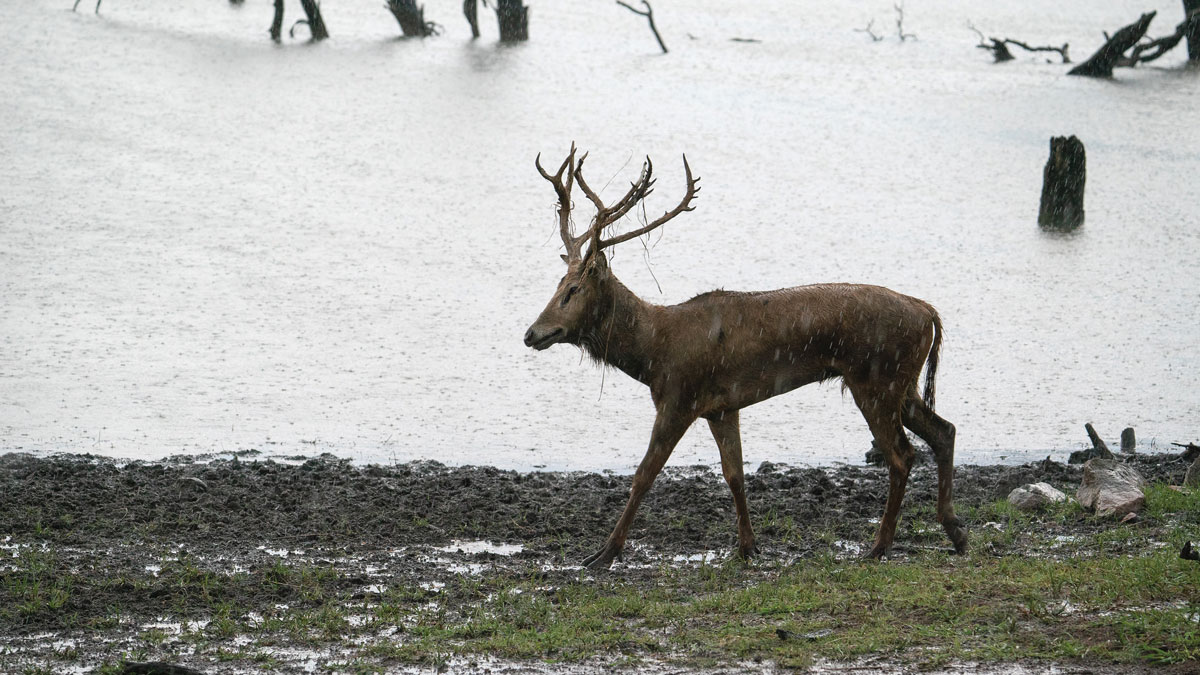
A young Père David’s deer struts through the rain on Sandstone Mountain Ranch in Llano County. These deer love the water, and I saw a large herd of them lounge in the mud and even swim across one of the many manmade lakes on the ranch. Staff photo by Dakota Morrissiey
The front gates of the ranch set the tone for the whole experience. Ornate stonework frames an enormous gate that swings open to the sound of a blaring alarm, used to frighten away nearby beasts that might try to make a break for it and to let ranch hands know the gate is open.
I was meeting with Lehne and his top hunting guide, Danny Parrish, to get the scoop on ranching exotics and experience an exotic hunt sans guns. Over the course of four visits to the ranch, I was able to gain some insight into the world of exotic game ranching and hunting in the Hill Country.
My first taste of the ranch’s wildlife was two towering giraffes watching my little black car pull up to the main barn. These, along with a handful of camels, llamas, kangaroos, and longhorns, are not for hunting. They are closer to pets than wild game for the Lehne family, who see the care of wildlife and hunting as much more than bagging a trophy.
“Hunting is about being with friends, making new friends, being together, being out in the wilderness,” Lehne said. “It’s all about being in the wild and being out in nature and appreciating the animals that are out there.”
Sandstone is definitely the wild, with towering pink granite monoliths, rugged mesquite flats, strangled oak groves, thick scrubland, and prickly pear-choked ravines creating a varied patchwork of picture-perfect vistas. It’s a Hill Country hunter’s dream, dead center in the most robust white-tailed deer population in Texas. Monstrous bucks roam behind the ample fencing of the ranch alongside oryx, Père David’s deer, eland, and blackbuck.
Over a dozen species live on the ranch, each one with a different price tag and availability. Booking a hunt means knowing what you’re going after. With exotics, you might have to do a little research.
“Some people don’t know what a red lechwe is,” Lehne joked.
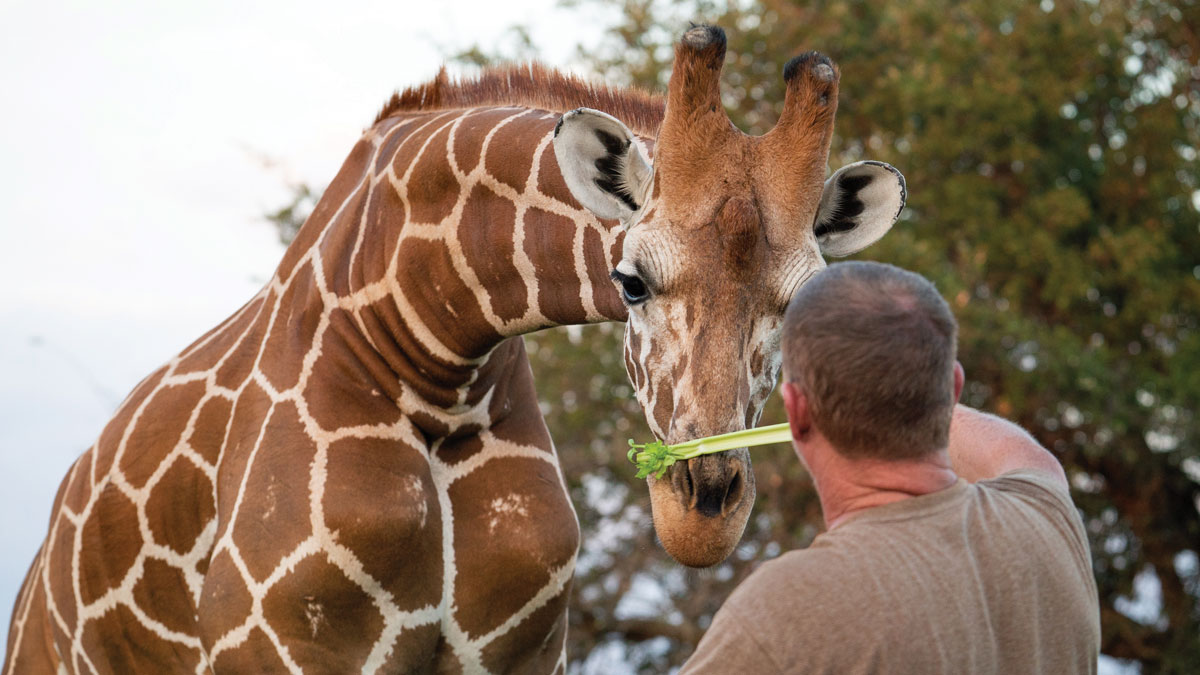
Sandstone Mountain Ranch hunting guide Danny Parrish attempts to feed a stalk of celery to Bob the giraffe. The two giraffes at Sandstone aren’t for hunting; they are closer to pets for ranch owner James Kyle Lehne and his family. Staff photo by Dakota Morrissiey
I was one of those people. For the record, a red lechwe is a scruffy antelope from southern Africa that loves the water.
Different portions of the ranch draw different animals, Lehne said. The aoudads like to spend their time on Sandstone Mountain, which looms on the horizon. The red lechwes and Père David’s deer tend to hang out around the manmade watering holes that dot the acreage. I watched a massive herd of Père David’s deer wade through a pond, dragging reeds and weeds through their antlers while our buggy bounced past. Continuing down the rugged, red dirt roads, I spotted the ghost white forms of oryx trampling through scrubby mesquite and skittish red deer dart into oak thickets.
This sort of experience would typically cost an enormous amount of time, money, and energy, traveling around the world, finding accommodations and a guide, taking a trophy, paying for the taxidermy in the country, and shipping the trophy home. While an exotic hunt in Texas is still a high-dollar activity, it is far cheaper than one abroad.
“It is a lot less expensive to take the same animal here and just as exciting,” Lehne said.
While traveling the ranch with Parrish, the guide, he regaled me with tales of close calls and near misses. Almost every hunter who comes here, he said, is looking for a real adventure, and he gives it to them.
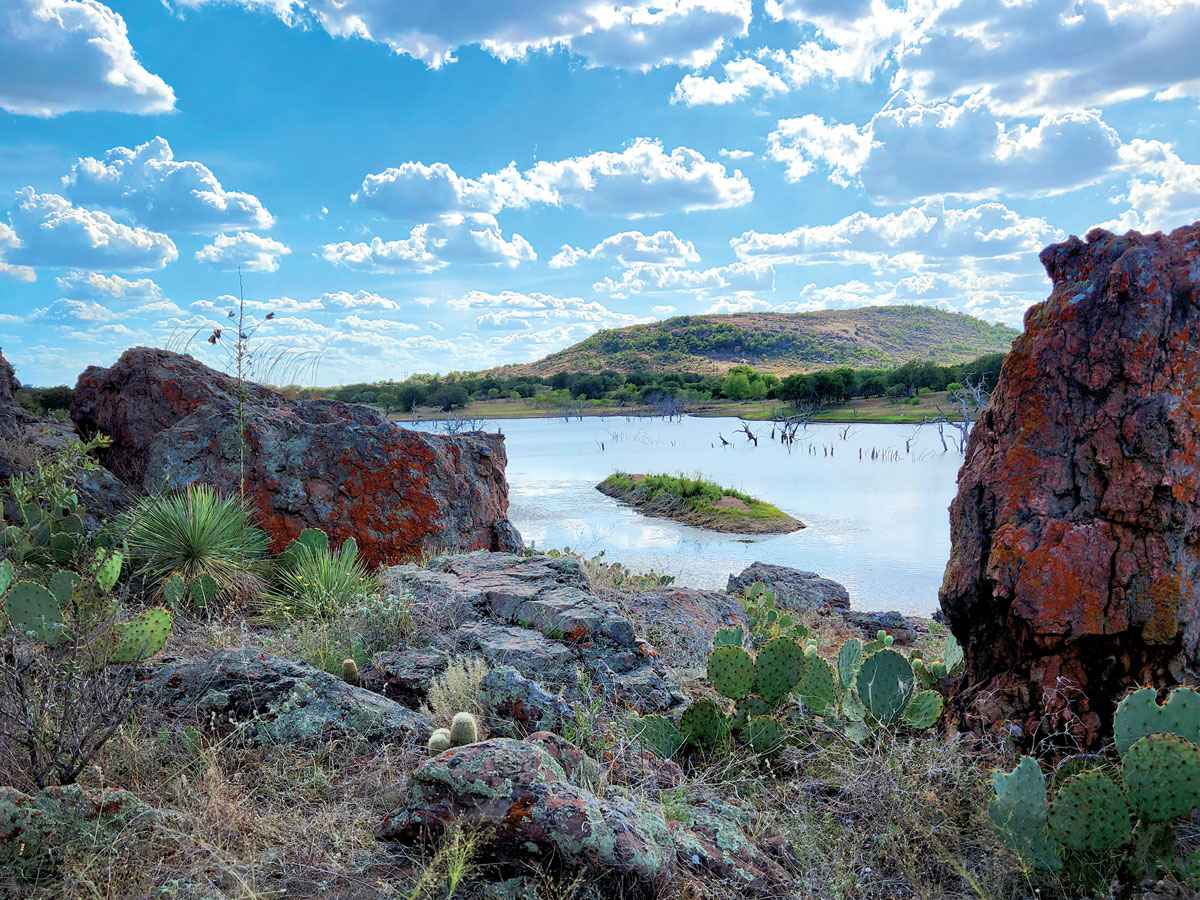
While waiting for your quarry at Sandstone Mountain Ranch, take in the scenic Hill Country beauty. Staff photo by David Bean
I was there to shoot an eland — with a 500mm lens instead of a rifle. The eland is the largest species of antelope in the world, reaching 6 feet or more at the shoulder and weighing in at over a ton fully grown. These animals are native to southern African countries such as Zimbabwe, Namibia, and, of course, South Africa. Lions are their primary predator. From what Parrish told me, they’re perfectly at home in Llano County.
I made four trips to the ranch. On my last visit, we set off late in the day, and I wasn’t sure I’d get the shot I wanted as the sun was quickly sinking and the landscape was turning blue in the evening light.
Parrish stopped the buggy and pointed. A herd of no fewer than 30 antelope grazed on a ridgeline maybe 300 yards away. We hopped out and crept closer. A decent marksman could have taken a shot from this distance. I was able to distinguish a few different species among the herd, a Sahara Desert-dwelling addax, an iconic wildebeest, and the massive forms of elands towering above the smaller antelope.
I was within a hundred yards, and the antelope began to spook and move. The sun was nearly swallowed by night. This was my last chance to get a shot.
While I adjusted my camera settings, the herd began to disappear behind the ridge. By the time I focused, only a single eland remained in my line of sight, and, for some reason, it chose to stop. I watched the sun sink behind the behemoth and snapped a photo before it trotted beyond the ridge, following the herd.
Parrish and I drove back to the barn and shook hands before I left. On my way to the formidable front gate, I watched a herd of oryx and zebra dart through the mesquite as the moon rose overhead. I realized that I didn’t have to cross an ocean for a safari adventure. Several are right here in my backyard.
Visit sandstonemountainranch.com for more information on booking an exotic game hunt.
dakota@thepicayune.com


